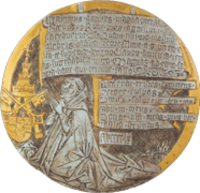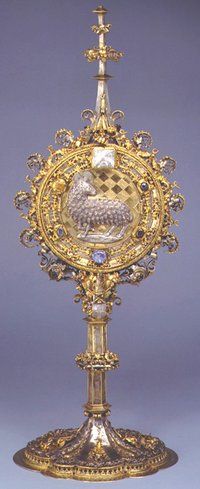The founding patron: Pope Pius II

Unlike other universities of the time, in Basel the role of the pope was not limited to issuing the privilege granting the right to found a university: the city promised him the role of founding patron “ad eternam memoriam” – an honor claimed in other cities by the feudal lord or city itself.
Enea Silvio Piccolomini (1405–1464) participated in the Council of Basel from 1432 as a companion of Cardinal Domenico Capranica, later becoming secretary to the antipope Felix V in 1440. At the University of Vienna in the mid-1450s, he lectured on the poets of antiquity, exerting a significant influence on German humanism. In 1447, he became the bishop of Trieste; in 1449, the bishop of Sienna; and in 1456, a cardinal. On 19 August 1458, he was elected pope in Rome and enthroned on 3 September. The Basel City Council combined its congratulations on his election with a request for a university foundation. Soon thereafter, on 10 September 1459, the city’s scribe Konrad Hienlin delivered a petition to the papal court in Mantua, requesting the establishment of a “studium generale” with all faculties, modeled after Bologna.
In essence, Basel was thus following the proposal that Archduke Albrecht had also made for Freiburg to Callixtus, but unlike Albrecht, they offered the pope the role of founding patron “ad eternam memoriam.” This offer was made solely in the context of obtaining the legal rights to found a university, before any financial considerations regarding the new institution were being negotiated. And even as the delicate issue of money soon became more pressing, the City Council stood by its proposal. It decided quickly on 10 October to accept the anticipated papal approval to establish the university and enlisted the help of the Basel Cathedral dean, Johann Werner von Flachslanden, who enjoyed the the special trust of Pius II as papal chamberlain, to indeed pursue the acquisition of a founding charter.
From letters regarding this matter sent to Flachslanden, it becomes clear that the city did not, at this point, view the granting of ecclesiastical benefices as a precondition for founding the university. The discreetly phrased mandate to the dean of the Basel Cathedral, directing him to influence the pope to incorporate benefices as an endowment for the university, either at the two church institutions in Basel, the cathedral and St. Peter’s, or elsewhere in the diocese, or in Strasbourg, shows that for the moment Basel politicians had decided to treat financial issues as secondary. The Founding Charter dated 12 November 1459 accordingly lacked any reference to a material endowment, allowing the pope to assume the role of founding patron while offering only the vaguest of prospects to Basel for church assets to support the new institution.
During these November days, however, disputes did suddenly arise about the financial security of the new institution. Suggestions were made that the founding of the new university should ultimately depend upon the incorporation of benefices by the pope. This negotiating position was soon abandoned, however, by 26 November, after the chapters of the Basel Cathedral and St. Peter’s Church had each agreed to endow the university with two benefices.
Efforts to establish the university made further progress, and before the end of the year, on 26 December, Basel succeeded in obtaining at least a bull from Pius II (who had been reticent about the incorporation requests) for the incorporation of five canonries, in Zurich, Zofingen, Solothurn, Colmar, and St. Ursanne, though the city was never able to actully realize these incorporations.
The bejeweled object known as the Agnus Dei ostensorium even more clearly demonstrates the connection between the cathedral chapter, the papal founding patron, the city of Basel, and most likely also the von Flachslanden family. The ostensorium was commissioned by the cathedral chapter between 1460 and 1466 under the cathedral dean Johann Werner von Flachslanden, paid for by donated funds and made using donated gems. It served to store a wax Agnus Dei consecrated by Pope Pius II and apparently given to the city of Basel in connection with the founding of the university. The engraved inscription on the back shows an image of the benefactor Pius II and mentions the great grace of an indulgence granted in 1460. The text reads verbatim:
MAXIMUS ANTISTES MAGNA PIETAT/E SECUNDUS HUNC PIUS AGNELLUM DEI / SACRAVERAT IPSE WUAM TIBI PRO MAGNO / CELEBRIS BASILEA DECORE MITTIT ET EX VETERI Q/UA TE SUB CORDE BENIGNO CLAUDIT AMICICIA VENI/AS SUPERADDIDIT ULTRO AGNAS AD EDEM SA/NCTA HANC QUI CRIMINE FASSO / ACCESERAT TRISTES EXPONENS / PECTORE CULPAS / DIVESQ SOLUETUR CELI RE/EABIT IN ORTUS / DONAT TIBI ENEAS PIUS HEC / BASILEA SECUNDUS /
MoCCCCoLXo
“Pope Pius II, of great piety, himself consecrated this Agnus Dei. He sends it to you, famed Basel, as a great honor, and from the ancient friendship that warmly embraces you within its heart he has graciously added great indulgences to these lambs for this holy church.
Whoever hurries to this church and confesses his transgressions, laying bare his sorrowful sins from the heart, will be absolved and will richly return to the beginnings of heaven.
This is gifted to you, Basel, by Eneas, the second Pius. 1460.”



